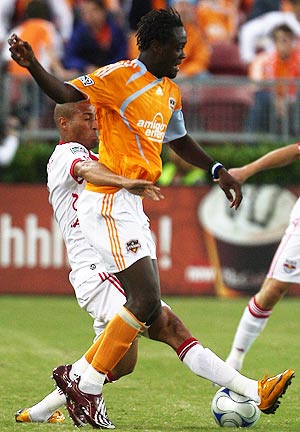MLS needs to come down hard on increasingly violent tackles
Then, in Week 3, there were four red cards. And this past weekend, another seven came out. Three of those early exits came in Saturday's Los Angeles-Chivas USA game. The so-called "Honda SuperClasico" may not be on par with Glasgow's Old Firm or Buenos Aires' superclásico, but it has plenty of fire and animosity in its own right. Along with the three red cards, there were six yellows and 31 fouls.
Now the referee bears some responsibility for the ugliness. The man in the middle, obviously, is the one making the decisions. On Saturday night, Tim Weyland put himself in the uncompromising position of having to hand out more and more punishment.
It reminded a friend of mine of the Portugal-Holland match from the 2006 World Cup, which included 12 yellows and four reds. In that game, the ref set an early standard of what was a yellow card and what wasn't -- the first booking came in the second minute -- and predictably spent the rest of the game issuing them like Simon Cowell dishes out insults. This, contrary to popular belief, doesn't control the players, but instead tends to set them off. Players take their frustrations out on the ref verbally; then, they take them out physically on their opponent's ankles.
For the most part during the last two red-tinted weekends, the refs got the ejections right. Maybe San Jose midfielder Shea Salinas' second yellow was soft, but it was bookable. Seattle goalkeeper Kasey Keller's handball outside the box clearly denied a goal-scoring opportunity. New York right back Carlos Johnson's mauling of Houston's Geoff Cameron deserved a few nights in Rikers Island, let alone an early shower. Two weeks ago, Columbus defender Andy Iro's lunge at Chivas' Carey Talley made me cringe; I'm still wondering why MLS' disciplinary committee didn't add an extra game to his suspension.
But the most interesting red card was the one to Houston's Mike Chabala. His dismissal came after a clash with New York's Danleigh Borman. Chabala does the ball with his studs up and lands his foot in Borman's leg. Automatic red card. Fine. Bravo, referee Hilario Grajeda.
However, if you really look at the play, you'll notice Borman, too, shows his studs. He slides with his leg extended, the knobby points of his cleats threatening to punch through whatever gets in the way. He doesn't connect. And so, he escapes any punishment. Why? If showing your studs on a tackle is considered "serious foul play," then why does contact make a difference? Shouldn't Borman have received some sort of punishment?
Remember when Arsenal's Eduardo da Silva had his leg snapped on a studs-up tackle by Martin Taylor? The play was a morbid hit on YouTube (I know I watched it more than once). But if Taylor had missed Eduardo or if Eduardo had skipped around Taylor's lunge, would the referee have done anything? If it's about intent, then contact shouldn't matter.
Ultimately, what I don't understand is where these studs-up, flying tackles are coming from. I know they've always been around, but it seems like they are more prevalent than ever. Why? Maybe it's natural to jump into a tackle this way, but to me it seems more natural to actually play defense.
The players themselves never have a suitable explanation. They usually say they were just late on the tackle. But why go in studs-up in the first place unless you are hoping to at least make your presence felt?
I was never taught to tackle this way. But it's been years since I've been out on a training field, so I asked a friend who coaches high-level youth soccer today. He said he doesn't coach studs-up tackling nor does he know anyone who does. In fact, he doesn't coach slide tackling at all.
Wherever the players are getting it, it's something on which the league must be sure to come down hard. The last thing MLS wants is an Eduardo-style injury.
From the beginning, MLS has been very fast and very physical, with relentless pressure and little time on the ball. In other words, it will never be a swing dance. But after two weekends of violent tackles, MLS should crack down on some of the offenders to make sure it doesn't turn into a roller derby.





